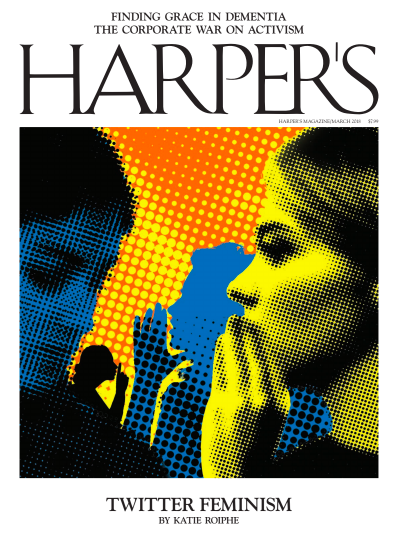In “The Other Whisper Network,” Katie Roiphe argues that #MeToo, whose goals she heartily endorses, has created its own variety of conformist backlash. In her view, women who stray from the movement’s heated rhetoric—from the take-no-prisoners tone so common on Twitter—are shunned, silenced, and shamed. The author draws from her own experience and from that of the twenty-odd women who form a Greek chorus of the “deeply anonymous.” She assails the note of moral purity that so often creeps into the discussion: “As a culture, we seem to be in the midst of dividing ourselves into the flawless and the fallen, the morally correct and the damned.” Human beings are more typically moral hybrids, the author suggests, and should be assessed on that basis. “If we are going through a true reckoning,” Roiphe writes, “there should be space for more authentically diverging points of view, a full range of feelings, space to hash through what is and is not sexual misconduct, which is an important and genuinely confusing question about which reasonable people can and will disagree.”
Rebecca Solnit takes a somewhat different position in this month’s Easy Chair column. “Nobody Knows” is not explicitly about #MeToo but about the casual uses and abuses of power—and the ways in which such power can blind the person possessing it. The high and mighty, she points out, “swathe themselves in obliviousness in order to avoid the pain of others and their own relationship to that pain.” But not surprisingly, her argument circles back to men and women—to the asymmetrical combat of America’s gender wars, which have taken their toll on Solnit and on so many others. There is the middle-aged cook who delighted in groping the young author when she worked in a diner; there is the Colorado DJ who stuck his hand up Taylor Swift’s skirt in 2013 (and was at least fired for his Trumpish initiative); there Harvey Weinstein and there is the low-level harasser who showered his unwanted favors on a young friend of Solnit’s. Her conclusion is not that men are wicked or irredeemable but that self-knowledge of any kind dictates a thorough immersion in the lives of others.
Elsewhere in the magazine, Sallie Tisdale explores the mixed blessings of dementia in “Out of Time.” To suggest that there are any blessings at all associated with Alzheimer’s disease will strike some readers as blasphemous. But the author, a registered nurse who has worked extensively with dementia patients, sees something “far more nuanced than the commentary surrounding it: there is grace here, rare intimacy, moments of startling clarity—and, yes, happiness.” Alan Lightman commits a different sort of blasphemy in “The Infinity of the Small,” suggesting that eternity is to be found not in the vast reaches of the universe but in the tiniest subdivisions of the physical world. Once we thought atoms were the smallest units of matter, the indivisible end of the road. Instead we have chopped those same atoms into ever more minuscule fragments, fetching up—for the moment, anyway—at the Planck length, where time flows backwards and “space has been blown thin by an ancient glassblower, so thin that it dissolves into nothingness.”
Ian MacDougall investigates the seamy world of SLAPPs (“strategic lawsuits against public participation”) in “Empty Suits,” exposing corporate America’s latest tactic to quash activist dissent. Maddy Crowell journeys to Kashmir, where the Indian government is attempting to quell the province’s irredentist itch by building a lavish railroad, complete with the world’s loftiest railway bridge—assuming it’s ever completed. And in “If These Walls Could Talk,” Lauren Markham addresses the current rage for barrier-building. It’s not just the United States that hears incessant talk about the Really Big Wall on the horizon. Even Norway has gotten into the game, erecting a pipsqueak fence on its northern boundary with Russia that stretches a mere 600 feet. “Walls offer the promise of absolute protection,” Markham muses, “but they almost always fail to deliver. Still, we build them again and again.”
We have a wild metafictional ride from Catherine Lacey in “Violations,” and strong critical pieces by Joanna Biggs (on Alan Hollinghurst’s new, tradition-bending novel) and Amia Srinivasan (on The Incest Diary, meaning yet another take on the issue of sexual consent). In Readings, Barbara Ehrenreich inveighs against physical fitness, Terry Southern recalls the glory days of the West Village, and Brenda Hillman contributes a brief poem from a work in progress. We also get a look at the editorial notes delivered to Milo Yiannopoulos, which caution him against laziness, humorous boasting, and literally scatological rhetoric: “Let’s leave ‘fecal waste’ analogies out of this chapter.”



